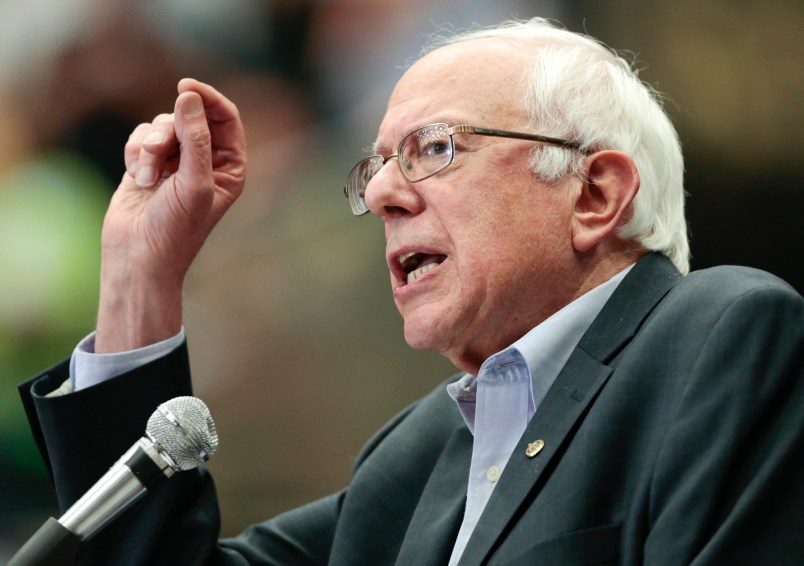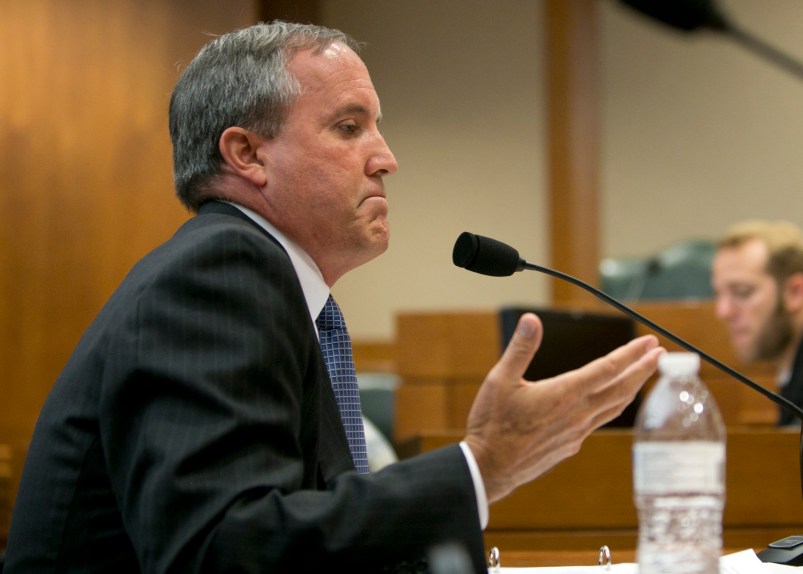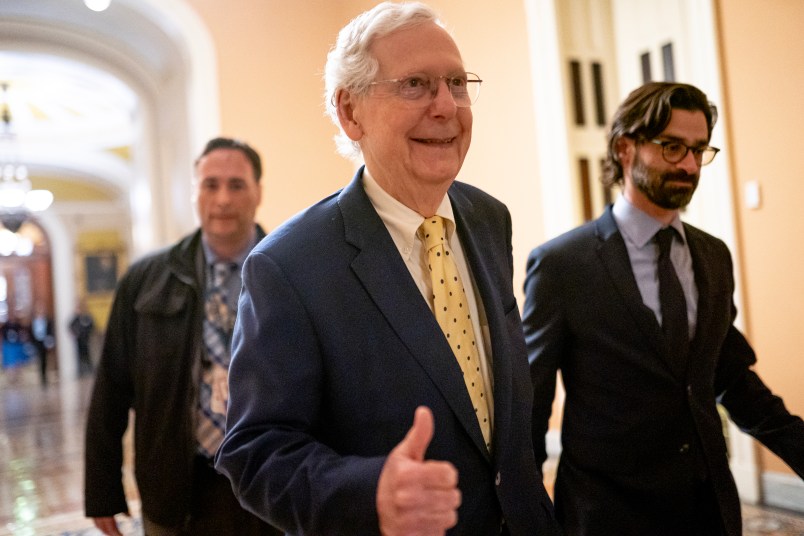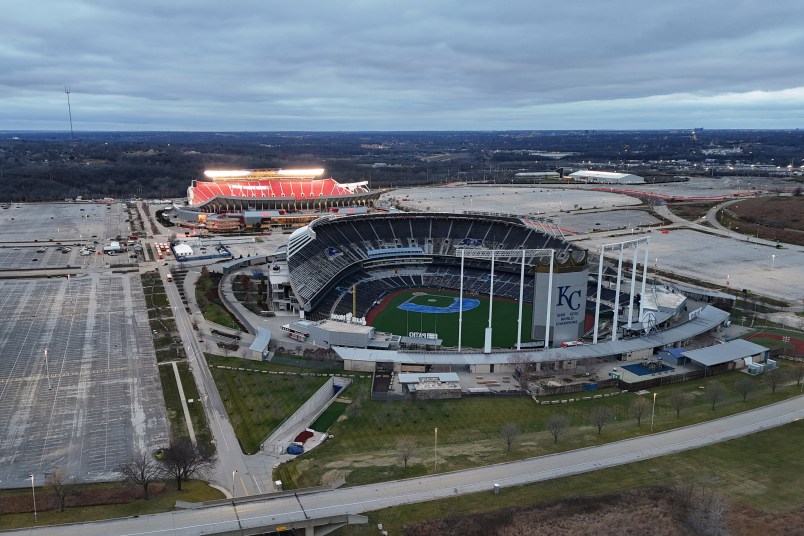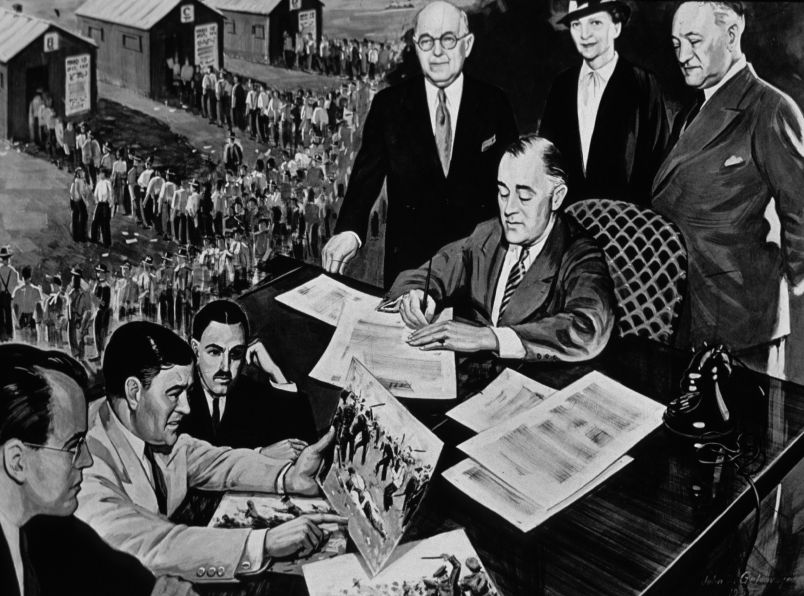As Bernie Sanders’ crowd sizes and early-state poll standings rapidly rise, a lot of pundits who are seeing the veteran senator in a new light are undoubtedly beginning to ask the question: Who is this guy, really? And the answer the pundits crave cannot be found in his biography or his campaign message, but involves the precedent we can use to understand what he represents. What iconic—or for that matter, completely forgotten—presidential candidate of the past does he most resemble?
The most dismissive impulse is to compare Sanders to Ron Paul: an old guy creating interesting but non-viable excitement among perpetually excitable young people who are good at filling empty seats for a noisy cause. At the moment, though, it seems Sanders may be outdrawing Paul the Elder, who in turn may be outdrawing Paul the Younger. More importantly, Bernie’s following includes crusty old union leaders, not just frothy young college students.
The answer Bernie’s backers might be tempted to offer is Barack Obama, who defeated an allegedly “inevitable” front-runner named Hillary Clinton on the passion and muscle of liberal activists and went on to become a two-term president. There are three problems with that analogy, all of them important. First, Sanders is running as much against Obama’s legacy as against anything pertaining specifically to Hillary Clinton. Second, all the revisionist history in the world won’t erase the fact that Obama, despite his strong appeal to liberal activists angry at HRC’s vote for the Iraq War, had a trans-ideological and even bipartisan appeal that Sanders is too consistently credentialed to rival. (Bernie is not going to get any primary endorsements from, say, Sam Nunn or David Boren).
Third, and most importantly, Sanders has zero demonstrated history of support from the African-American and Latino voters who will play a huge role in the nomination contest after Iowa and New Hampshire. Obama won well over 80 percent of the African-American vote and an estimated one-third of the Latino vote against Clinton, who had strong initial backing in both communities. Particularly if HRC gets implicit or explicit support from Obama next year, her residual strength among minority voters could well stop Sanders in his tracks even if he sweeps the exceptionally honkified first two states.
If Sanders is not the next Barack Obama, he could be construed as one of those occasional insurgents who leads a hostile if peaceful takeover of a party establishment that’s lost ideological touch with its base. Again, though, that precedent is based on the dubious presumption that Bernie Sanders can actually win the Democratic presidential nomination, not just throw a scare into Hillary Clinton. Moreover, the record of even the most successful ideological insurgents—William Jennings Bryan and George McGovern among Democrats and Barry Goldwater among Republicans—stops well short of the White House.
If we discard these analogies, then perhaps the best models Team Sanders can hope for are campaigns that signaled future change, or at least scrambled expectations in a fundamental way. Far and away the best-case scenario for the Sanders campaign, in my opinion, is something resembling Ronald Reagan’s 1976 challenge to Gerald Ford, which fell short of victory, but signaled the impending conquest of the GOP by the conservative movement. Since Bernie will turn 79 before the 2020 elections, it’s not likely he could emulate Reagan’s leadership of the ultimate insurgent triumph, but he could pave the way for a left-bent successor.
A more immediate impact would result from a Sanders campaign that succeeded in emulating Eugene McCarthy’s 1968 presidential run. By showing LBJ’s vulnerability in New Hampshire (and then leading LBJ in polls for the second primary state, Wisconsin), McCarthy helped drive the incumbent president (and heavy front-runner) from the race and opened things up for other candidates, notably Robert F. Kennedy and Hubert Humphrey.
In the end, of course, LBJ’s designated successor HHH won the nomination and Richard Nixon won the presidency, but only after McCarthy and Kennedy fought each other in key primaries and then RFK was assassinated. One could in theory imagine Sanders so wounding HRC in Iowa and New Hampshire that she drops out and/or other candidates of the “center” or “left”—Biden? Warren? Gillibrand?—drop in.
And finally, there are candidacies that fell short but set precedents for more subtle yet influential party trends. It’s certainly arguable that Jesse Jackson’s two campaigns in 1984 and 1988 made Barack Obama’s 2008 effort less jarring to white Americans. Gary Hart’s momentarily successful “new ideas” campaign in 1984 in many respects served as a bridge between the antiwar “reform” candidacy of George McGovern (which Hart managed) and the heterodox New Democrat candidacy of Bill Clinton.
But the most recent analog that makes some sense is Howard Dean’s 2004 campaign. No, Sanders is unlikely to obtain the Establishment backing that briefly made Dean the Democratic front-runner—indeed, the probable nominee, after he was endorsed by 2000 nominee Al Gore and Iowa political titan Tom Harkin. And there’s no reason to assume that if Bernie did rise to such heights he’d instantly implode like Dean did in and after Iowa (felled by—take your pick—”the Scream,” an Establishment cabal, poor management of campaign finances, smart tactics by Kerry and Edwards, or a cultural disconnect between Iowa Democrats and Dean’s orange-capped hipster volunteers).
What Dean and Sanders both represent is a protest against accommodationist policies towards Republicans by Democratic leaders. Dean famously referred to the entire Clinton administration as an exercise in “damage control.” Sanders is the champion of those who regard a significant segment of the Clinton and Obama economic policies as “Republican Lite.” Dean is now remembered partly for spearheading a clean break between Democrats and the Bush administration on Iraq, and partly for innovations in fundraising and social media use that Obama soon turned into pure political gold.
Some Democrats hope Sanders can thread the needle of “keeping Hillary honest” and moving the Democratic Party elites closer to “the base” on financial and trade issues, without helping produce the Republican victories that spoiled previous moments of Democratic self-renewal in 1968 and 1972 and 1984 and 2004 (and for that matter, 1896, 1900 and 1904, the Bryan trifecta of prophetic but unsuccessful campaigns). The high stakes Democrats are increasingly perceiving in 2016 could, however, undermine the high spirits Bernie is presently inspiring. At some point, early-state caucus and primary voters may be affected by watching their Republican neighbors snake-dancing to the polls full of excitement at the prospect of demolishing Obama’s and Clinton’s accomplishments before turning their jack-hammers on the broader edifice of the New Deal and Great Society.
Ed Kilgore is the principal blogger for Washington Monthly’s Political Animal blog, Managing Editor of The Democratic Strategist, and a Senior Fellow at the Progressive Policy Institute. Earlier he worked for three governors and a U.S. Senator. He can be followed on Twitter at @ed_kilgore.





